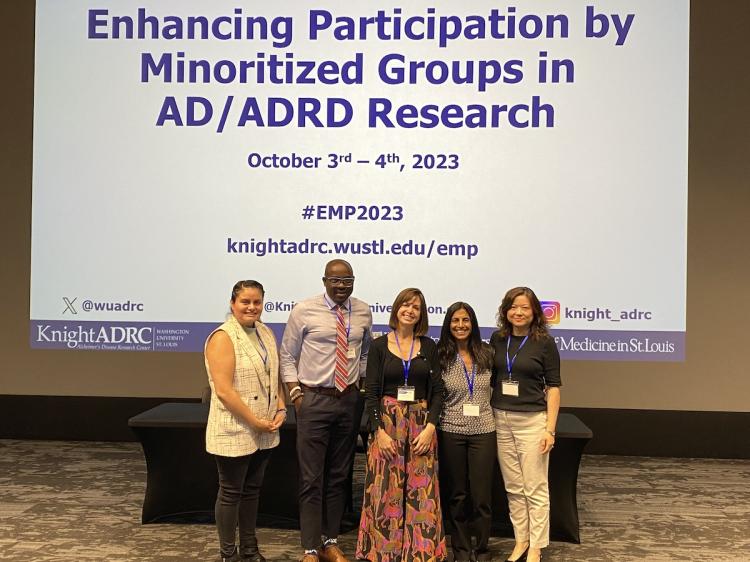
(from left) UW ADRC’s Janet Rojina, MPH, Derick Aranda, MD, Luciana Fonseca, PhD, Suman Jayadev, MD, and Linda Ko, PhD attended an ADRC-hosted conference to discuss and shape the future of Alzheimer’s disease research participation.
By Janet Rojina, MPH, research coordinator on the UW ADRC Outreach, Recruitment and Engagement (ORE) team
As published in Dimensions Magazine for Fall/Winter 2023.
This October, I had the privilege of traveling to St. Louis, Missouri to attend the “Enhancing Participation by Minoritized Groups in Alzheimer Disease and Related Dementia Research Conference.” This event was organized and hosted by the Knight Alzheimer Disease Research Center and served as a continuation and scaling up of the 2018 workshop on African American Participation in Research and involved all 37 ADRCs nationally, as well as other groups collaborating with communities.
The idea was to bring together members of the academic community to engage in conversations and help steer Alzheimer’s disease research participation to include representation from minoritized groups. This is a matter of great significance for Alzheimer disease and related dementia research because it is projected that by 2050, over 40% of older adults will be composed of individuals from minoritized populations. Historically, individuals that participate in research are predominantly non-Hispanic whites, underscoring the importance of addressing the issue.
For me, this was a particularly exciting opportunity because a big part of my role as a UW ADRC research coordinator involves actively building partnerships with community members from minoritized or underrepresented groups, providing education about brain health, and bringing UW ADRC research opportunities to community members who have been historically underrepresented in research. As I approached the conference, my objective was to gain new insights from the speakers, my peers, and the work that they are doing so that I can compare our approaches, learn from other groups, and also share successful strategies from our center. Read on for some highlights of the conference.
Conference Highlights
Enhancing Participation by Minoritized Groups in Alzheimer Disease and Related Dementia Research
- Building Trust Mark Gluck, PhD from Rutgers University introduced 10 evidence-based strategies that his team employed to recruit over 500 older African Americans from the broader Newark area into their brain health research program since 2015. Examples of the measures include building trust through long-term investments in community health and hiring a large engagement team with deep connections to the community. “This presentation offered practical solutions and ideas that can readily be applied to effectively recruiting and retaining research participants within the African American male demographic, which historically have been the most challenging cohort to get involved in research,” said Derick Aranda, MD, of the Cleveland Clinic and also a Trainee in our ADRC Research Education Component (REC).
- Learning from the Community Dedra Buchwald, MD, ADRC Native Research and Resource Core Lead, and Amanda Boyd, PhD from Washington State University also shared recruitment lessons learned from engaging with individuals from American Indian/Alaska Native (AI/AN) communities. They emphasized the importance of distributing information through Native organizations and including members of the AI/AN community on the research team.
- Expanding Research Social determinants of health are non-medical factors, such as neighborhood resources, education, income, stress, or social connection, that are shown to influence brain health outcomes. Megan Zuelsdorff, PhD of the University of Wisconsin-Madison presented on a national effort to systematically collect this information from ADRC research participants. Studying the social and environmental context of participants’ lives, alongside their medical and biological data, is needed to help us understand what is driving the population-level disparities in Alzheimer’s and how we can build better clinical and behavioral interventions.
I return from the conference with many new ideas to implement, connections for potential collaborations, and a renewed enthusiasm to continue the important work that we do. As I work, I will carry with me the wisdom of conference speaker Sid O’Bryant, PhD of the University of North Texas, who encouraged us to “Be bold!” and recognize that reaching diverse communities isn’t more challenging; it merely requires a distinct approach and UW ADRC is part of that transformative wisdom. • Janet Rojina, MPH




